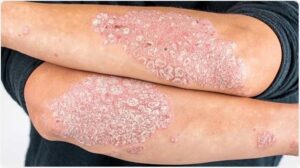
Psoriasis is a chronic autoimmune skin condition that accelerates the life cycle of skin cells, causing them to build up on the surface of the skin more quickly than normal. This rapid cell turnover leads to the formation of thick, scaly patches that can vary in size and severity. The most common symptoms of psoriasis include red patches of skin covered with silvery scales, dry or cracked skin that may bleed, itching, burning sensations, and, in some cases, stiff or swollen joints. While psoriasis primarily affects the skin, its impact goes far beyond physical symptoms, significantly influencing mental health and overall quality of life.
Living with psoriasis can be emotionally and socially challenging. Individuals may experience low self-esteem, anxiety, and depression due to the visibility of their condition, especially if plaques appear on prominent areas like the face, hands, or scalp. The condition can also disrupt everyday activities, as the discomfort from itching or joint pain can interfere with everyday routines. Psoriasis is not transmissible, but the misconceptions surrounding it can lead to social stigma and isolation.
Curing psoriasis permanently is a difficult challenge because it involves an interplay of genetic, immune, and environmental factors. The chronic nature of the condition means that symptoms often come and go, even with effective treatment. While managing symptoms and achieving remission is possible for many, finding a permanent solution remains elusive for medical science. This article explores the causes, current treatments, and lifestyle strategies for managing psoriasis, as well as the ongoing search for a permanent cure.
Causes of Psoriasis
Psoriasis originates from a combination of genetic predisposition, immune system dysfunction, and environmental triggers. These factors collectively contribute to the chronic and periodic nature of the condition.
- Genetic Factors
Research has shown that genetics plays a significant role in the development of psoriasis. People with a family history of psoriasis are more likely to develop the condition themselves. Scientists have identified certain genes associated with the immune system, such as those involved in regulating inflammation, that may increase the risk of psoriasis. However, having these genetic markers does not guarantee that someone will develop psoriasis, as other factors are also at play. - Immune System Dysfunction
Psoriasis is considered an autoimmune condition, meaning it occurs when the immune system mistakenly attacks healthy skin cells. In individuals with psoriasis, the immune system triggers an inflammatory response that accelerates the production of skin cells. Instead of the typical 28 to 30 days it takes for new skin cells to develop and shed, this process happens in just 3 to 4 days. The excess skin cells pile up on the surface of the skin, forming the characteristic plaques of psoriasis. - Environmental Triggers
Environmental factors can trigger psoriasis flare-ups or worsen existing symptoms. Common triggers include infections (such as strep throat), stress, skin injuries, certain medications, smoking, and excessive alcohol consumption. Cold weather and dry climates can also aggravate the condition, while sunlight may improve symptoms for some individuals.
The interplay between these factors highlights why psoriasis is so difficult to treat permanently. While treatments can address symptoms and manage triggers, the underlying genetic and immune system components remain unchanged, leading to the potential for recurring flare-ups.
Treatments for Psoriasis
Managing psoriasis typically involves a combination of treatments tailored to the severity of the condition and the individual’s response. While these treatments can significantly improve symptoms and quality of life, they are not curative and must often be used long-term.
1. Topical Treatments

Topical therapies are often the first line of defence for mild to moderate psoriasis. These include corticosteroids, vitamin D analogues (such as calcipotriol), salicylic acid, coal tar, and moisturisers. Corticosteroids, in particular, are highly effective at reducing inflammation and slowing skin cell turnover. However, long-term use of these treatments can cause side effects, such as skin thinning or resistance to the medication.
2. Phototherapy

Phototherapy involves exposing the skin to controlled doses of ultraviolet (UV) light. This treatment can help slow skin cell production and reduce inflammation. Narrowband UVB therapy is commonly used and has been shown to improve symptoms in many patients. However, phototherapy requires multiple sessions over time and is not suitable for everyone. Prolonged exposure to UV light also carries the risk of skin damage.
3. Systemic Medications

For moderate to severe psoriasis or cases that do not respond to topical treatments or phototherapy, systemic medications may be prescribed. These include traditional systemic drugs like methotrexate, cyclosporine, and acitretin, as well as newer biologic therapies. Biologics target specific components of the immune system, such as cytokines involved in inflammation, and have revolutionised psoriasis treatment in recent years. Despite their effectiveness, systemic treatments can have significant side effects, and biologics are often expensive and require ongoing administration.
While these treatments can bring psoriasis into remission and reduce the frequency and severity of flare-ups, they do not address the root causes of the condition. Discontinuing treatment often leads to a return of symptoms, highlighting the need for further advancements in medical science.
Concept of a Permanent Cure
The idea of permanently curing psoriasis remains an ongoing area of research and debate within the medical community. While there have been significant advancements in understanding and treating the condition, several challenges make achieving a permanent solution difficult.
- Ongoing Research and Potential Breakthroughs
Scientists are continually exploring new treatment approaches, including gene therapy, regenerative medicine, and advanced immunotherapy. Gene therapy, for instance, aims to correct the genetic mutations associated with psoriasis, potentially eliminating the root cause of the condition. Similarly, research into the microbiome—the community of microorganisms living on and within the human body—has shown promise in understanding how gut and skin health interact in psoriasis. Modifying the microbiome could potentially reduce inflammation and improve symptoms. - Challenges in Achieving a Cure
One of the main obstacles to curing psoriasis is the complexity of its causes. Since the condition is influenced by both genetic and environmental factors, any potential cure would need to address multiple pathways. Additionally, the autoimmune nature of psoriasis complicates treatment, as resetting or suppressing the immune system without causing unintended consequences is a delicate balance. - Personalized Medicine
Advances in personalised medicine hold promise for tailoring treatments to individual patients based on their unique genetic, immune, and environmental profiles. By addressing the specific factors driving psoriasis in each person, researchers may come closer to developing long-term solutions. However, this approach requires extensive research and significant investment in healthcare infrastructure.
While a permanent cure for psoriasis may not yet be within reach, ongoing scientific efforts continue to improve treatment options, offering hope for the future.
Lifestyle Changes and Management Tips
In addition to medical treatments, making lifestyle changes can significantly help individuals manage psoriasis symptoms and improve their quality of life. The following tips focus on reducing triggers, promoting skin health, and supporting overall well-being.
- Diet and Nutrition
While there is no specific diet for psoriasis, some individuals find that certain foods can worsen or improve symptoms. A diet rich in fruits, vegetables, whole grains, lean proteins, and healthy fats can support overall health and reduce inflammation. Foods high in omega-3 fatty acids, such as salmon, walnuts, and flaxseeds, may be particularly beneficial. On the other hand, it may be helpful to limit processed foods, sugary snacks, and alcohol, as these can trigger inflammation. - Stress Management
Stress is a well-known trigger for psoriasis flare-ups, so finding ways to manage stress is essential. Practices such as yoga, meditation, deep breathing exercises, and regular physical activity can help reduce stress levels. Setting aside time for hobbies and relaxation can also improve mental health and resilience. - Skincare Routine
Keeping the skin moisturised is crucial for individuals with psoriasis, as dry skin can exacerbate symptoms. Use fragrance-free, hypoallergenic moisturisers or ointments to lock in moisture, especially after bathing. Avoid harsh soaps or products that can irritate the skin, and consider using a humidifier during dry weather to prevent skin from becoming too dry. - Avoiding Triggers
Identifying and avoiding personal triggers is an important part of managing psoriasis. This may involve avoiding smoking, moderating alcohol intake, protecting the skin from injuries, and taking steps to prevent infections. Keeping a symptom diary can help individuals identify patterns and understand which factors are most likely to trigger flare-ups.
By incorporating these lifestyle strategies into their routine, individuals with psoriasis can take an active role in managing their condition and improving their quality of life.
Conclusion
Psoriasis is a complex, chronic condition influenced by genetic, immune, and environmental factors. Its symptoms, which include red, scaly plaques and inflammation, can significantly impact both physical and emotional well-being. Current treatments, such as topical therapies, phototherapy, and systemic medications, can help manage symptoms and achieve remission but do not offer a permanent cure.
Research into the underlying causes of psoriasis continues to advance, with promising developments in areas like gene therapy, microbiome studies, and personalised medicine. However, the multifaceted nature of the condition makes finding a one-size-fits-all cure a significant challenge.
In the meantime, individuals can take steps to improve their quality of life through lifestyle changes, such as maintaining a healthy diet, managing stress, practising good skincare, and avoiding triggers. While a permanent cure for psoriasis may not yet be available, the combination of medical treatments and self-care strategies can help individuals manage their condition and lead fulfilling lives.
For those living with psoriasis, it’s important to remember that you are not alone. Support from healthcare providers, loved ones, and patient communities can make a meaningful difference in navigating the challenges of this condition.
We provide you with authentic, trustworthy and relevant information. Want to know more?
Have an issue with the content report problem.